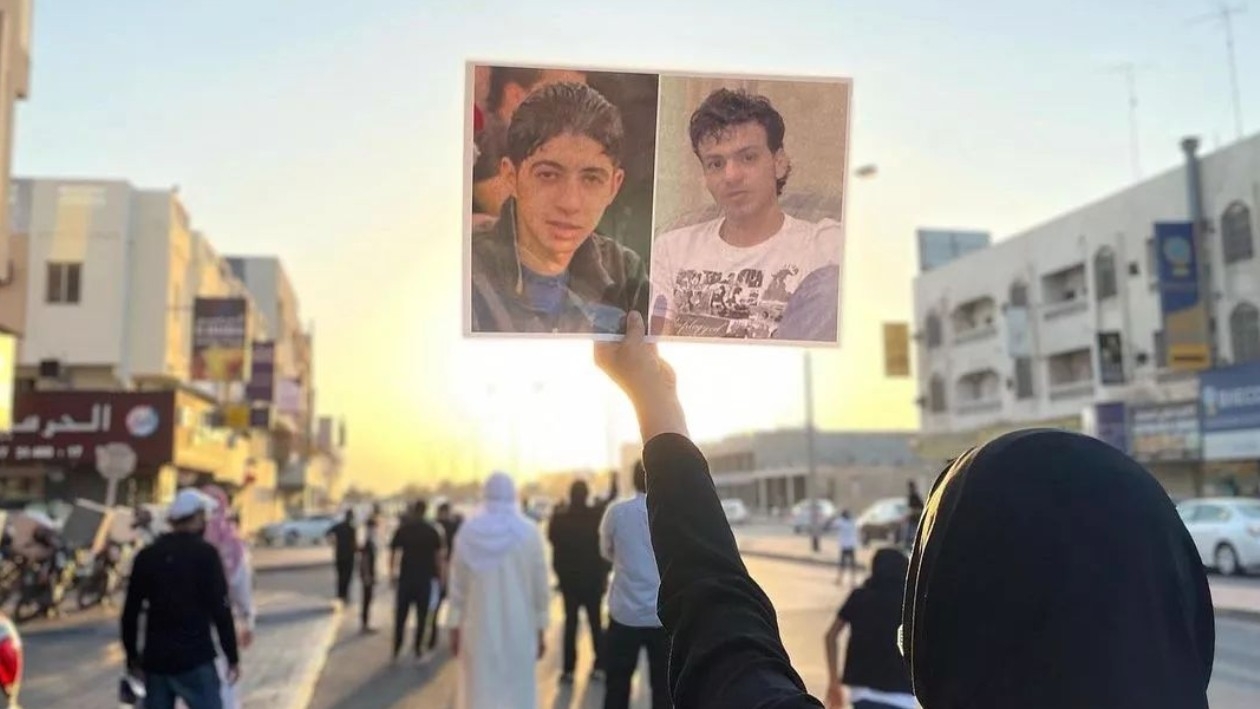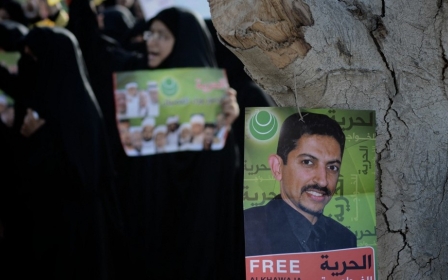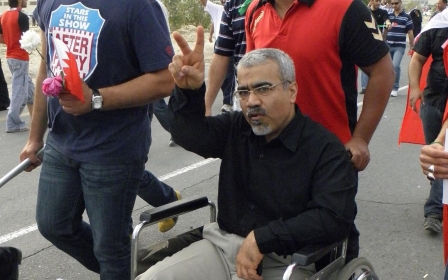Bahrain: Hundreds of political prisoners enter fourth week of hunger strike

Around 800 political prisoners and human rights activists are taking part in the fourth week of a mass hunger strike inside Bahrain’s Jau prison.
The protest is one of the largest of its kind since mass unrest broke out in the small Gulf kingdom in 2011.
The prisoners taking part were convicted for their role in protests after the pro-democracy uprising in 2011 and for their criticisms of Bahrain's government.
Activists say the prisoners' trials were unfair and were aimed at repressing anti-government activities.
The hunger strike started on 7 August, with prisoners demanding an improvement to the conditions in which they are held.
New MEE newsletter: Jerusalem Dispatch
Sign up to get the latest insights and analysis on Israel-Palestine, alongside Turkey Unpacked and other MEE newsletters
Their demands include an end to solitary confinement, access to proper medical care and unimpeded family visits.
Bahraini human rights activists said there was no other option to bring attention to the plight of the country's political prisoners.
The body as 'tool of protest'
“People don’t choose to go on hunger strike unless you feel like you have no tools left,” said Maryam Al-Khawaja, the daughter of Abdulhadi Al-Khawaja, one of those imprisoned.
“You have to really be pushed to the edge and feel like you have no other way to defend yourself... except to use your own body as a tool of protest,” she told Middle East Eye.
Those held in the Jau prison are locked in their cells for around 23 hours a day, and have little to no access to medical care. Some reports also state that they have been subjected to severe physical, sexual and psychological torture.
'I don't think you can describe what it feels like to watch someone you love slowly disappear'
- Maryam Al-Khawaja, Bahraini activist
Maryam’s father was arrested in the kingdom in April 2011 for his involvement in pro-democracy protests.
“In 2012, I almost lost my father when he went on the 110-day hunger strike, then he was force fed," Maryam said. "I don't think you can describe what it feels like to watch someone you love slowly disappear."
Maryam has previously gone on hunger strike herself to raise awareness of her father’s case.
“I was on hunger strike for around five days only, and I remember on the second and third day I was in a lot of pain, having difficulty getting out of bed, so I can’t imagine what those on hunger strike for a month feel.”
Maryam said that hunger strikes often have long-term health consequences and that her father still suffers from the effects of his refusal of food a decade ago.
“It takes a very dire effect on the body and your ability to move and speak. Everything becomes difficult, even mundane and regular things take a lot of energy.”
'Shackled'
Sayed Ahmed Alwadaei, the director of advocacy at the Bahrain Institute for Rights and Democracy (Bird), said the prisoners had taken the difficult decision to go on hunger strike due to suffering caused by their conditions.
“They are enduring degrading treatment,” he told Middle East Eye. "Many prisoners suffer from skin diseases due to poor sanitation and lack of washing blankets."
'They are enduring degrading treatment. Many prisoners suffer from skin diseases due to poor sanitation and lack of washing blankets'
– Bahrain Institute for Rights and Democracy
Some prisoners have been held in solitary confinement for over a year and are only permitted to leave their cell for an hour every day.
Among their demands are to increase the time they spend outside of their cell, to be allowed to pray in congregation, and to make phone calls.
While prisoners are normally entitled to an hour of family visits every week, the authorities have limited this to 30 minutes behind a glass barrier.
“One of the biggest problems in Jau prison is the system's denial of medical care, which prisoners have referred to as a slow death," Alwadaei added. “There are routine shortages in necessary medications and authorities have allegedly purposely denied prisoners access to the medications they require."
According to Alwadaei, those held in isolation are also subject to a range of other abuses.
“Their hands and feet are shackled during the one hour they are permitted to use the outside area and they have intensely monitored phone calls that are disconnected by authorities as soon as they attempt to discuss any abuse,” he said.
Local media reports claim that at least three detainees at the prison have already been hospitalised as their condition deteriorates on hunger strike.
Families protest on the streets
The hunger strikes have triggered protests in Bahrain, organised by the prisoners' relatives.
Families have come out into the streets holding photos of their family members behind bars, demanding that they be freed.
While the protests have been fairly small in number, they are viewed as significant, given the crackdown on government critics.
Bahrain has denied allegations that there is medical neglect and limited visitation rights in its prisons, arguing that conditions are in line with international standards.
Earlier this month, Human Rights Watch (HRW) called on Bahrain to address the grievances of those on hunger strike.
“The authorities should also release anyone serving a prison term solely for exercising their right to freedom of expression and peaceful assembly, starting with prominent human rights defenders Abdulhadi Al-Khawaja and Abduljalil al-Singace,” the organisation said in the statement.
Niku Jafarnia, the Bahrain and Yemen researcher for HRW, said that many prisoners had been subject to “grossly unfair trials” and had experienced “years of abuse in custody”.
“Bahraini authorities need to ensure humane detention conditions and immediately release those unjustly imprisoned,” she said.
Officials from the US State Department, the EU and the UN have all expressed concern over the issue. However, activists have raised concern that the UK government, which is a close ally of Bahrain, has yet to acknowledge the ongoing hunger strike.
The UK is home to a vocal community of Bahraini dissidents, who have staged protests outside the Bahraini embassy in solidarity with the inmates.
Middle East Eye delivers independent and unrivalled coverage and analysis of the Middle East, North Africa and beyond. To learn more about republishing this content and the associated fees, please fill out this form. More about MEE can be found here.




